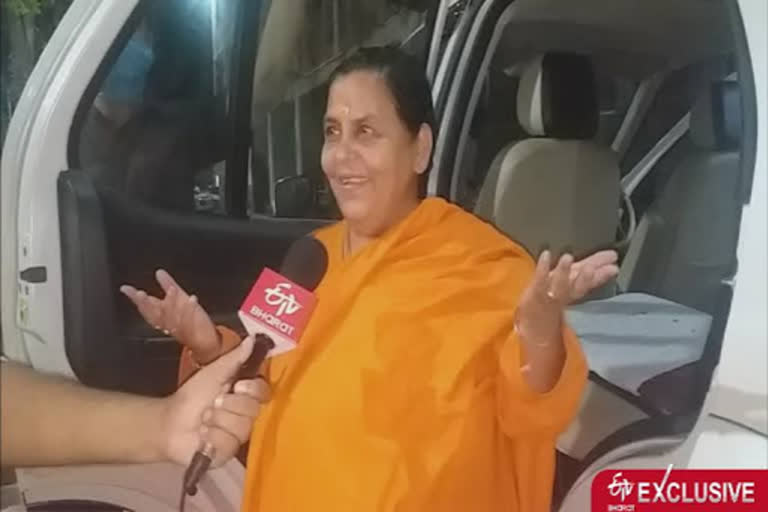Lucknow (Uttar Pradesh): Lashing out at the opposition, former Union minister Uma Bharti on Tuesday said that all the wrongs that were committed post independence, will be corrected during Prime Minister's Narendra Modi's tenure.
The BJP leader, who was in Lucknow for a special court hearing, spoke exclusively to ETV Bharat about her plans regarding the river Ganga, and the state of affairs in the country today.
'All wrongs will be corrected during PM Modi's tenure'
Responding to Congress leader Rahul Gandhi's criticism of the government over the China issue, Bharti said that it was only the media which is doing its duty by putting out his side, as his views were not worth commenting upon.
"There exists no opposition today due to Rahul Gandhi's faults, like the way he let Jyotiraditya Scindia go. The media is doing its duty of upholding democratic values by putting out his view. Or else, his statements are not worth commenting upon," she said.
Escalating her attack on the Congress, Bharti said, "Rahul Gandhi is talking about China. What happened when Jawaharlal Nehru was the Prime Minister? Whatever wrongs were committed post independence, will all be rectified during Prime Minister Narendra Modi's tenure."
'Communal harmony strengthened post Ayodhya verdict'
Speaking about the Ayodhya verdict, Bharti said that there were apprehensions earlier which led to the verdict getting delayed, but none of it came true.
Read: Plea in SC seeks disclosure of India's trade policies with China
"People used to think what might happen when the verdict comes. But nothing untoward happened. The way the people accepted the court's verdict, unity and communal harmony has only strengthened in the country," she said.
'Will keep working for Ganga'
Bharti, who was the Ganga rejuvenation minister, said that she will continue to work for the river even though she is no longer a minister.
"I started a non-political campaign on foot from Gangotri. The way the Ayodhya dispute reached a conclusion, there will be a substantial decisn on the Ganga soon," she said.
She added that she decided to take a step away from the government when it came to the issue of Ganga, as she felt the river belonged to the people and not the government. "Ganga can be saved not through government monitoring, but through people's participation. I want the people to play an active role," she said.
Read: How can privatisation, FDI possibly make us a self-reliant nation?



